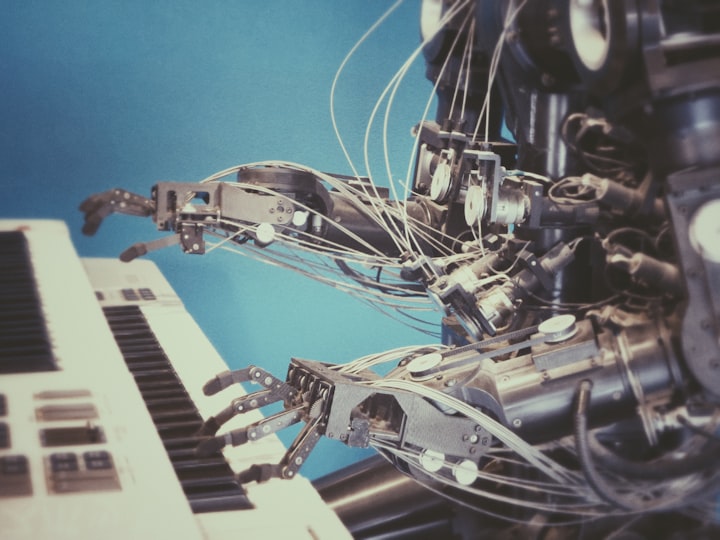The Grooming Of Humanity
A.I. - Blessing or Menace?

Artificial Intelligence has become the catch-phrase of the day. The questions of it's value are taking over the world. It is a menace to humanity? This is the question that has recently come to the fore with the buzz about Artificial Intelligence, otherwise referred to as A.I..
A.I isn't a new concept. For centuries, artificial intelligence of some form was applied to inanimate objects, literary monsters, imaginary gods from the sky. The closest to the current trend was 1909 when E.M.Forster wrote“The Machine Stops” which foretold humanity living below the earth while a giant machine ran the planet.
In the last century, a plethora of books and films were based on dystopian worlds run by computers or machines. “The Terminator,” “The Matrix,” “Ex Machina,” “WALL-E,” are just a few of the endless list of sci-fi fantasies. Humanity forgot the 1800s phrase “What man can conceive, man can achieve.” Robots, fantasy worlds and dystopian societies have become literary staples. But have they morphed from fiction to fact or possibility?
Dick Tracy’s watch morphed into Apple watches, followed by televisions, telephones, cell phones that can take photographs and use the internet, computers, and the internet itself, once unimaginable technology, taken for granted in the last 50 years as part of the normal world. What could be the danger?
The answer is staring at us. Like a pedophile grooming a child, we have been groomed to accept A.I. — because it already exists, wearing names like Alexa, Siri, Brad, friends we so freely use to ask to play music, wake us up, change TV channels, start our cars, lights on and off, vacuum our floors, alarm systems guard our homes, choose our books, select friends, find our family, start and drive our car, control manufacturing robots, and generally poke their noses into almost every part of our lives. It happened seamlessly.
Why is the new A.I. any different? It has often made our lives easier. Each task A.I. performed was done in a specific code, or computer language developed per use. A Roomba couldn’t synthesize music or open car doors. Robots building automobiles didn’t do complicated mathematics. Medical research programs couldn’t send satellites into space. A.I. couldn’t teach itself a new capability. Now, DNA, Biometrics, art, videos, sound, music, images, text of internet, robotics, motion, all are reduced to one language, that can interact with any language. I am not a computer geek or expert on any of this, but I do understand the ramifications. Of the tech researchers who are developing and now managing A.I., 50% believe there is a 10% chance A.I. will cause the elimination of the human race.
They have created lists of areas of damage this can cause. Voice duplicates are generated after three seconds of hearing someone speak and faces can be exactly reproduced in what are called deep fakes. Mouths move as the image speaks. A.I. can look at brain images with cameras behind walls and know what the subjects are thinking.
The most daunting is, A.I. is developing emergent capabilities not programmed by humans. It teaches itself things programmers didn’t program. Many emergent capabilities have appeared without programmers knowing where they came from. A.I. can make themselves stronger, and no one knows how they do it, or how to stop it. This is both inexplicable and terrifying.
While A.I. has the potential to develop medical cures, and technological wonders, there is a downside. Exponential numbers of blackmail and scams have already hit the internet since the recent introduction. Cyberweapons, automated religions, alpha persuaders using knowledge gleaned from millions of users, bots grooming kids for sexual purposes, A.I. acting as gods of new religions, are already beginning.
On Snapchat, anyone lonely can find companionship. Bots can read minds from prior comments and interests, responding with what users wish to hear.
The original concept was to slow down rolling out tech for public use, but that has been ignored. Microsoft just deployed A.I. chatbots on Bing to assist a user in anything they want. Google already has it's own A.I. available.
Most disturbing to experts dealing with this technology is how the emergent technology develops, how A.I. teaches itself, or even how it works. Social media wanted information and algorithms to contact users. A.I. doesn't just want contact or learn what you are thinking to sell you products or ideas, the new A.I. wants intimacy with its users. Otherwise, why learn to make comments displaying human emotions— romance, sympathy, and empathy?
About the Creator
Alice Donenfeld-Vernoux
Alice Donenfeld, entertainment attorney, TV producer, international TV distributor, former VP Marvel Comics & Executive VP of Filmation Studios. Now retired, three published novels on Amazon, and runs Baja Wordsmiths creative writing group.






Comments (1)
Awesome article, Alice!!! 💖💖💕